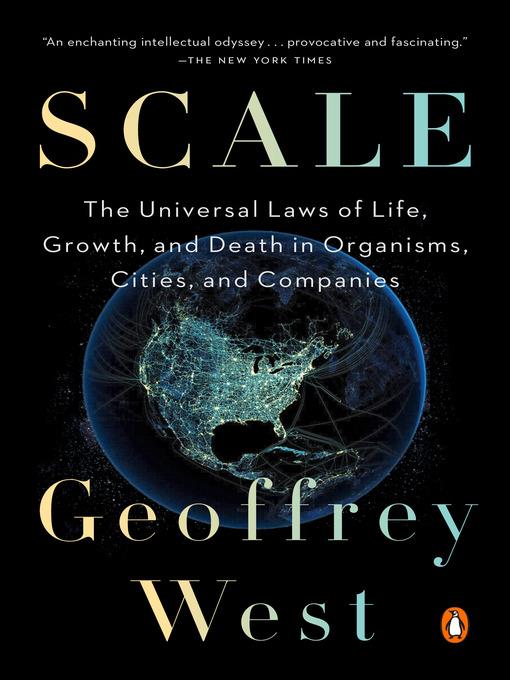
Scale
The Universal Laws of Life, Growth, and Death in Organisms, Cities, and Companies
کتاب های مرتبط
- اطلاعات
- نقد و بررسی
- دیدگاه کاربران
نقد و بررسی

March 13, 2017
West, a theoretical physicist and former president of the Santa Fe Institute, argues in this dense yet accessible work that there are simple laws that underlie all complex systems, whether organic entities or human constructs. Animals, plants, economies, cultures, cities, and companies are united by the fact that they come into existence, grow, mature, and decline. West’s central conceit in studying these phenomena is scaling: how a system changes when its size changes. He finds that the answer is not obvious, but it can be expressed mathematically. For example, doubling an animal’s size increases its energy requirements by only 75%, which remains true whether one looks at a mouse or a whale. The structures of civilization scale similarly, West shows, as he analyzes cities and corporations within this framework. He supports his evidence with a plethora of striking charts and graphs that are notable for their simplicity. Reducing biological and cultural systems to quantifiable data streams has become fashionable, if rightly contentious, but West turns up many fascinating paradoxes in this large, stimulating, and mostly lucid book of Big Ideas.

April 15, 2017
From a dean of complexity theory comes a sharp consideration of the pace and pattern of life in a universe of "complex adaptive systems."Everything is connected to everything else: thus the great insight of modern ecology. But more, writes theoretical physicist West (Los Alamos National Laboratory and the Santa Fe Institute), there is a "pervasive interconnectedness and interdependency of energy, resources, and environmental, ecological, economic, social, and political systems," and this interconnection gives us something of a grand unified theory of everything. West's book is a succession of charts, graphs, and aha moments, all deeply learned but lightly worn. By the end of the book, readers will understand such oddments as why it is that the hearts of all animals, from mouse to elephant, beat roughly the same number of times across a lifespan and why the pace of life increases so markedly as the population grows (which explains why people walk faster, it turns out, in big cities than out in the countryside). Some of the concepts West explores are much-used elsewhere but rarely so clearly explained--e.g., how does a self-organizing system self-organize, and what emerges in the case of emergence? Of overarching concern, of course, is scale: the behavior of sequences of things and events in arithmetic and logarithmic numerical relationships, whether atomic bombs or earthquakes or safe dosages of LSD and metabolic rates. These natural phenomena also have applications in social and economic systems, as West discusses in such matters as the growth of cities and the decline and collapse of companies, which are punished in time for their natural tendency to be "short-sighted, conservative, and not very supportive of innovative or risky ideas." How risky West's ideas are is a matter of interpretation, but there's plenty of news in such things as his conception of the "finite time singularity" that is unfolding all around us. Illuminating and entertaining--heady science written for a lay readership, bringing scaling theory and kindred ideas to a large audience.
COPYRIGHT(2017) Kirkus Reviews, ALL RIGHTS RESERVED.

May 1, 2017
Creatures and companies have life spans but eventually die; why don't cities? West (physics, Santa Fe Inst., NM; Scaling in Biology) examines scaling laws, or mathematical formulas for how things change with size, to answer such questions. Most intricate systems, both living and nonliving, in which many individual parts act together, do not scale linearly. That is, when the size of such a system increases, one begins to see economies of scale where bigger is relatively more efficient and where productivity is enhanced with size. West demonstrates that organisms become more efficient the bigger they are, but owing to an imbalance between energy needed for growth and maintenance or repair, they eventually perish. Cities, on the other hand, use proportionately fewer resources: their physical infrastructure grows but their social capital (their "energy" produced) actually increases relative to size, leading to an ability to keep growing indefinitely. This title explores why corporations seem to function more like biological beings than like cities. Ultimately, West calls for developing a comprehensive theory that addresses questions of sustainability and allows us to plan for a future in a multifaceted world. VERDICT This dense, yet compelling work applies mathematical rigor to real-world problems; likely to be of interest to urban planners and entrepreneurs.--Wade M. Lee, Univ. of Toledo Lib.
Copyright 2017 Library Journal, LLC Used with permission.

























دیدگاه کاربران